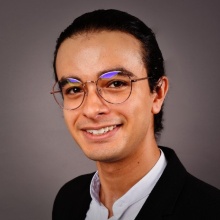Foreign students enrich not only the research but also the culture of a university. In recognition of this, the German Academic Exchange Service (DAAD) provides funds to award an annual prize to outstanding foreign students.
This year, the International Office selected Skander Kamoun. The prizewinner from Tunisia has been doing his doctorate and research as a research assistant at the Institute of Aerodynamics and Gas Dynamics (IAG) in the Aircraft Aerodynamics group since September 2023. In addition to his professional qualifications, he received the award primarily because of his strong social commitment. He was involved in intercultural exchange between students at AIESEC and was a member of the Tunisian group of the on-line network IVAO.
The DAAD prize will be awarded on Day of Teaching and Learning on April 10, 2024.
Why did you choose the study program aerospace engineering? What excites you about aerospace?
I chose the study program Aerospace Engineering because I am deeply interested in aviation. I have been fascinated by airplanes for a long time. During my years at secondary school, I decided that this was exactly what I wanted to study after graduating. I am particularly fascinated about the interplay of phenomena that make flying possible. This fascination has not diminished over time.
What goals are you currently pursuing?
My interests are now focused more on aerodynamics and flow simulation, areas in which I specialized while pursing my Master’s degree. I recently started my doctorate at the Institute of Aerodynamics and Gas Dynamics in the Aircraft Aerodynamics group headed by Dr. Thorsten Lutz. I work as part of the DFG research unit FOR 2895. The aim of the group is to numerically and experimentally investigate the time-varying phenomena and interactions that occur at the flight envelope of commercial aircraft.
What is the biggest difference between Stuttgart and your birthplace in Tunisia?
Sfax is the city where I was born and raised. Looking at the inhabitants, I would say that there are more similarities than differences between the Swabians and the “Sfaksi”. Both are described as hard-working and thrifty. The saying “schaffe schaffe Häusle baue” [Work and work to build a house] could just as easily be applied in Sfax. However, the two cities differ in terms of mobility. While considerable sums are being invested in public transport and cycling infrastructure in Stuttgart, only new roads are being built in Sfax. The difference is noticeable when you compare the alternatives available to safely and reliably get from point A to point B.
You have been involved in intercultural exchange between students as part of AIESEC. Why is that so important?
AIESEC offers students the opportunity to go abroad in order to complete internships or take part in social projects. This gives students an insight into other countries and cultures. Emphasis is placed on learning different approaches to problem solving. For example, by working together on social projects in the target countries. I know from my own experience that some aspects that may be taken for granted in Germany are perceived differently in other countries. People with different backgrounds can act differently in the same situations. Experience abroad is therefore important in order to be able to develop a certain understanding of this, among other things. I want to encourage students to go abroad. I also want to support them in the process. Of course, such relatively short stays offer only a small insight into a country. But I am nevertheless convinced that these experiences at least make you think about how to deal with other cultures.
Among other things, you were a member of the on-line network IVAO: What projects did you work on there?
Because virtual flying and hobby flight simulation are not well known in Tunisia, I was active in the Tunisian group at IVAO. I was concerned mainly with integrating new members into the group and explaining the basics to them. I also helped organize events simulating real flight operations at Tunisian airports. The aim is to make them as realistic as possible. We also want to give everyone the opportunity to deepen their knowledge of flight guidance and aviation technology.
What advice would you give to young people who want to get involved in volunteer work?
There are various opportunities for volunteering at the university. It is therefore crucial to know what you would like to do. You should perhaps ask yourself the following questions: Which voluntary work fits well with my own values? What goals do I want to achieve by volunteering? That way you will always stay motivated. You can ask various university groups and organizations and try out different things until you find the right one for you. I would also advise against doing too much at the beginning and instead recommend gradually taking on more work. In this way, you will be able to balance your university studies, volunteer commitments, and other secondary employment.


